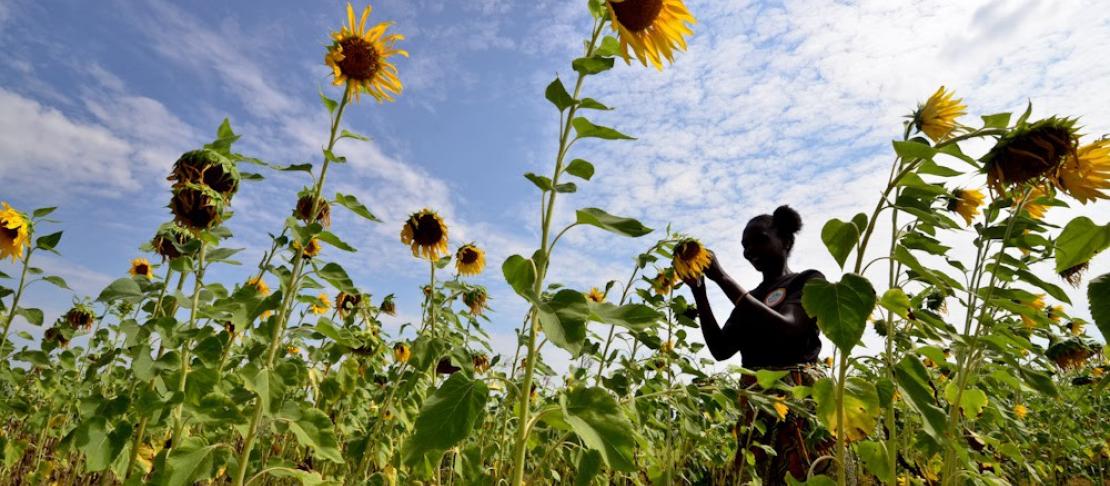A changing climate changes the game for agriculture and rural development

by Caity Peterson
The strangely erratic rainfall of the past few years has left Emily Marigu of Meru, Kenya wondering when she should plant her crops. When the rains do come, she says, they are so fast and heavy they wash away her soil. Joel Yiri of Jirapa, Ghana is fending off ever-worsening droughts and has seen his yield of ground nuts drastically diminish, in part due to a growing season that is much shorter than he remembers. In Punjab, India, Gurbachan Singh is worried about a repeat of the disastrous floods which destroyed his village’s rice harvest last year, while in Ninigui, Burkina Faso, Ganame Ousseni has watched bitterly as his farm’s forests and grasses are consumed by desertification.
Climate change, the perennial offender, is at the root of all these farmers’ problems. Changes in crop suitability, greater frequency of extreme weather events, and shifts in the distributions of pests and diseases add to the list of worries. What’s more, the impact of these changes on agricultural systems and communities dependent on natural resources is still “largely a closed book,” according to a report recently released by the CGIAR Research Program on Climate Change, Agriculture and Food Security (CCAFS). The report, “Impacts of climate change on the agricultural and aquatic systems and natural resources within the CGIAR’s mandate,” emphasizes the need for extensive research to bring some clarification to matters affecting the vulnerability of impoverished farmers. What should already be clear, however, is that any attempt to define the direction of Agriculture for Rural Development (ARD) – such as the Global Conference on ARD (GCARD2) taking place in Uruguay next week – needs to keep climate change impacts at the forefront of consideration.
With this necessity in mind, CCAFS will make its presence felt at the GCARD2 conference, jointly organized by the CGIAR and the Global Forum on Agricultural Research (GFAR) to define a roadmap for integrating foresight, partnership and capacity development into innovations for smallholder livelihoods.
Developing socio-economic scenarios in East Africa, for example, is helping regional and national governments make better-informed decisions on how to address the inevitable challenges brought on by climate change. Stakeholders are encouraged to imagine freely how they want their future society to look, and from there they work backwards to develop a feasible plan to achieve the vision. The plans are placed in the context of a variety of scenarios: will state actors be pro-active and willing to create partnerships? Or will they be fragmented and reactive? The resulting strategies for a food secure future are robust under a number of plausible scenarios. At GCARD2, CCAFS’ Scenarios Officer Joost Vervoort will be detailing the importance of involving a number of stakeholders in the scenario-building process to create informed, practical plans for adaptation and food security policy.
To strategize effectively, we must also be able to project climate scenarios and their implications for different regions of the world. Only then can we begin to flesh out the kinds of regional or international partnerships that might need to be developed to help ameliorate negative climate impacts, as James Kinyangi, Regional Program Leader for the CCAFS East Africa program, will elaborate. In Ghana, for example, CCAFS has been encouraging the adoption of climate smart agriculture practices to tackle climate-induced challenges. Jesse Naab of the Savanna Agricultural Research Institute in Ghana will point to gender mainstreaming as a key to avoid further impoverishment of already marginalized groups when exploring adaptation options.
What, then, does the outcome of the GCARD2 conference mean for Emily, Joel, Gurbachan and Ganame? We can be sure that they and other smallholders in the tropics and sub-tropics are some of the most vulnerable in the world to the negative impacts of climate change. Their best hope for coping with erosion, floods, droughts, pests and diseases, and the myriad other challenges that will face them as the climate becomes more unpredictable is that participants in the conference pledge to redouble efforts in climate change research and innovation. Otherwise, the “book” of climate change impacts will remain closed and agricultural research for development will suffer as a result.
For more information on the conference see the GCARD2 official website and the GCARD2 blog.
Caity Peterson is a visiting researcher based at the International Center for Tropical Agriculture (CIAT) in Colombia, working on CCAFS Theme 1: Adaptation to Progressive Climate Change. To get more updates, follow us on Facebook, and Twitter @Cgiarclimate.